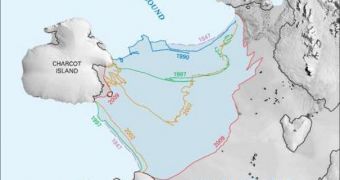Scientists at the United States Geological Survey (USGS) announce that their latest study indicates the Antarctic Peninsula is steadily losing its ice shelves. They say that climate change is the main influence on the southern sections of the area, and that the end result will most likely be retreating glaciers and rising sea levels. Coastal communities and other low-lying regions around the globe – such as islands – will be the most severely affected, with some territories believed to be in danger of being submerged completely, the specialists say. All of this can be avoided if global warming is mitigated.
The USGS report highlights the fact that every single ice front in the southern Antarctic Peninsula has been retreating constantly between 1947 and 2009. The largest increase in melting rates was recorded after 1990, the group also adds. In addition to the southern areas of the region, the entire Peninsula has been constantly losing its ice shelves starting at the end of the last century. This discovery is chilling, experts reveal. These floating ices are directly responsible for holding in place the land-based ice caps, which cover about 98 percent of the Southern Continent.
They are attacked from all sides. The ozone layer's improvements means more heat in the region, carbon dioxide concentrations are spiraling out of control, massive waves forming in the Pacific slam into them, and warming water temperatures erode them from underneath. If they go, then there will be nothing holding back the land-based ice, which will slip into the sea, considerably rising the levels of the world's oceans. At this point, climatologists and meteorologists widely consider changes in the Peninsula to be a clear indicator of what will happen on the rest of the continent later on.
“This research is part of a larger ongoing USGS project that is for the first time studying the entire Antarctic coastline in detail, and this is important because the Antarctic ice sheet contains 91 percent of Earth’s glacier ice. The loss of ice shelves is evidence of the effects of global warming. We need to be alert and continually understand and observe how our climate system is changing,” says Jane Ferrigno, who is a scientist at the USGS. Also involved in this investigation were researchers from the British Antarctic Survey, the Scott Polar Research Institute, and Germany experts from the Bundesamt fur Kartographie und Geodasie.

 14 DAY TRIAL //
14 DAY TRIAL //